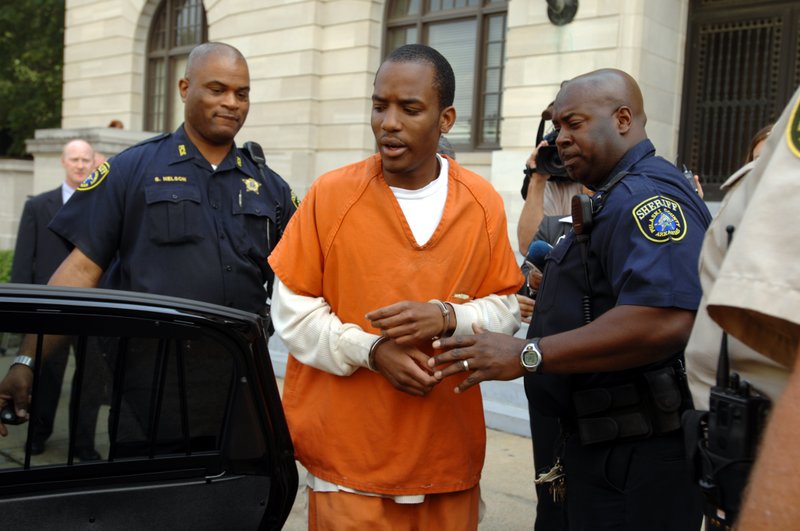LITTLE ROCK — Prosecutors accused a 21-year-old Little Rock man, a childhood friend of convicted child-killer Kevin Lawrence Banks, of luring a witness in a murder case against Banks into a fatal ambush last year.
Deputy prosecutor Jennifer Waymack told Pulaski County Circuit Judge Willard Proctor Jr. on Tuesday that Wayne Earl Jones Jr. had telephoned 21-year-old Thomas Steven Okafur to go to Interstate Park, where she said Okafur was killed.
No arrests have been made in the death of Okafur, who was found shot in the park on Feb. 29, 2008. Both police and prosecutors said Tuesday that Okafur's killing remains under investigation.
Banks and his 21-year-old half brother, Ricky Dale Smith, are serving life sentences for capital murder for killing 6-year-old Kamya Weathersby in a December 2007 shooting at the girl's home that authorities believe was an assassination attempt on the boyfriend of the girl's mother, Antoine Demetrius "Turtle" Jones. The brothers wanted Antoine Jones dead, authorities say, because they believed he had sided against them in a feud over the slaying of Brent "Pawn" Pettus, 25. Pettus was killed nine days before Kamya, and Banks was convicted of first degree murder for Pettus' slaying in November and received a second life sentence.
Wayne Jones, who is not related to Antoine Jones, was sentenced to 4 1 /2 years Tuesday for lying at Banks' September capital-murder trial, and Waymack leveled the accusation about Okafur against him at sentencing for Jones' perjury conviction. Defense attorney Latonya Austin objected to Waymack questioning Jones about the Okafur slaying, calling it irrelevant to the perjury charge, but the judge allowed the questions when Waymack pointed out that Jones admitted to a similar role in Pettus' slaying.
At Banks' request, Waymack said, Jones arranged a marijuana deal between Pettus and Banks on the night Pettus was killed and dropped Pettus off with Banks.
"He is doing the bidding of Kevin Banks and Ricky Smith in setting people up," Waymack said, emphasizing that authorities don't believe he was directly involved in the slayings.
Waymack also questioned Jones about what he knew about burns suffered by another man, John Kenneth Porchia Jr., 20, on the day Okafur was killed. Okafur's car was later found to have been set on fire, and Porchia, a friend of Smith's, was hospitalized for his injuries, the prosecutor said. Porchia is jailed awaiting sentencing on federal drug charges. Questions about Porchia's burns were also raised at Banks' trial in Pettus' killing.
Jones didn't dispute calling Okafur, testifying that he regularly phoned Okafur, who lived next door to Jones' cousin, to play video games. But Jones said he didn't know anything about Okafur's slaying and denied that he'd ever called Okafur to get him to go to the park.
Proctor convicted Jones on Tuesday of perjury for lying at Banks' trial in the death of the girl about police threatening him. Jones testified at trial that statements he had made to police, which included Banks telling him about killing the girl, were coerced by Little Rock police detective Tommy Hudson, who had told him what to say.
The detective, backed by fellow detective Kevin Simpson and Dewanna Phillips, testified at Jones' bench trial Tuesday that he'd never been abusive. Harsh interrogations aren't usually successful, the detective said.
"I get more with honey than anything else, threatening them, berating them," Hudson said.
Waymack, the prosecutor, laid out 19 points in Jones' hour long trial testimony that authorities claimed were lies. Austin, Jones' attorney, countered that there were at most eight lies in what he told the jury, but none of them were serious enough to be a crime. She argued that police and prosecutors had exaggerated Jones' importance as a witness and that any lies he told didn't affect the trial.
Proctor agreed that not every point from prosecutors rose to the level of a crime. But he said Jones' testimony about police brutality were clearly serious, saying the lies could've caused jurors to doubt the credibility of the officers.
Jones asked the judge for leniency, testifying that he made mistakes because he feared for the safety of himself and his family over the ramifications of what he'd told police and his trial testimony.
"I lied but I wasn't trying to do anything wrong," he told the judge. "I was trying to protect my family."
But questioned by Waymack, Jones testified he still fears the police, particularly Hudson, and continued to maintain Hudson threatened him.
"I was told a lot of things could happen to me. There's a lot of things going on you don't see," he said. "He did some things, but it's over and I've got to accept it."
Arkansas, Pages 9, 13 on 08/26/2009
